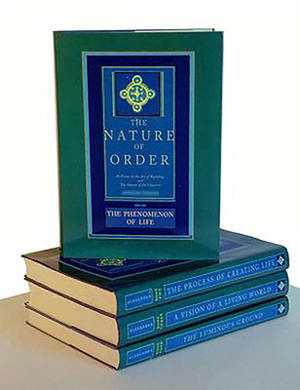
- Retrait gratuit dans votre magasin Club
- 7.000.000 titres dans notre catalogue
- Payer en toute sécurité
- Toujours un magasin près de chez vous
- Retrait gratuit dans votre magasin Club
- 7.000.0000 titres dans notre catalogue
- Payer en toute sécurité
- Toujours un magasin près de chez vous
The Nature of Order, Four-Volume Set
An Essay on the Art of Building and the Nature of the Universe
Christopher Alexander
268,45 €
+ 536 points
Description
Christopher Alexander has been a legendary figure in architecture for nearly 40 years. World-renowned for his revolutionary theories on the art of building, Alexander now caps his lifetime of profoundly original thinking about the meaning and purpose of architecture with this magnum opus, The Nature of Order. In these four books, Alexander constructs an entirely new cosmology, grounded in the latest scientific knowledge, and integrating the perennial wisdom of the centrality of human experience and values. In this way, Alexander reunifies for the field of architecture the 400-year old split of Body (structure) and Soul (feeling). Alexander explores the properties of life itself, highlighting a set of well-defined structures present in all order and in all life from micro-organisms and mountain ranges to good houses and vibrant communities. Taken as a whole, the four books create a sweeping new conception of the nature of things which is both objective and structural (hence part of science) and also personal (in that it shows how and why things have the power to touch the human heart). A step has been taken, through which these two domains the domain of geometrical structure and the feeling it creates kept separate during four centuries of scientific though from 1600 to 2000, have finally been united. The Nature of Order constitutes the backbone of Building Beauty: Ecologic Design Construction Process, an initiative aimed at radically reforming architecture education, with the emphasis of making as a way to access a transformative vision of the world. The 15 fundamental properties of life guide our work and have given us much more than a set of solutions. The Nature of Order has given us the framework in which we can search and build up our own solutions. In order to be authentically sustainable, buildings and places have to be cared for and loved over generations. Beautiful buildings and places are more likely to be loved, and they become more beautiful, and loved, through the attention given to them over time. Beauty is therefore, not a luxury, or an option, it includes and transcends technological innovation, and is a necessary requirement for a truly sustainable culture.
Spécifications
Parties prenantes
- Auteur(s) :
- Editeur:
Contenu
- Nombre de pages :
- 2143
- Langue:
- Anglais
- Collection :
- Tome:
- n° 12
Caractéristiques
- EAN:
- 9780972652902
- Date de parution :
- 01-04-06
- Format:
- Livre relié
- Format numérique:
- Genaaid
- Dimensions :
- 272 mm x 331 mm
- Poids :
- 6123 g

Les avis
Nous publions uniquement les avis qui respectent les conditions requises. Consultez nos conditions pour les avis.






